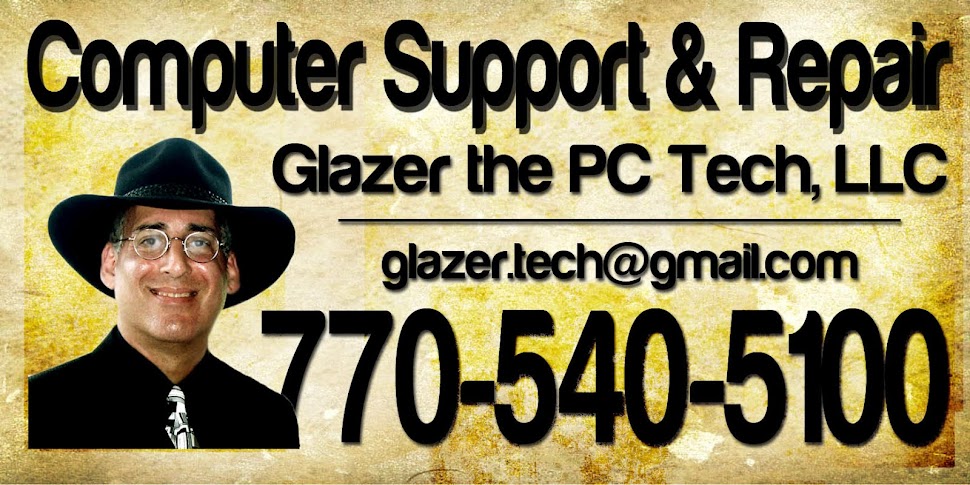arthur@glazerthepctech.com
There’s a new computer in town, and it’s small. Classified as netbooks, these subcompact mini-laptops are something to be considered. By the end of the year more and more people will be considering them. As their size gets smaller, more options will be offered.
I’ve looked at the Dell, HP, Sony, Acer, Samsung, MSI, Lenovo and Asus models, all of which have much in common. To begin with, they all have 8- to 10-inch screens. HP has one with a 12-inch screen, but most of the newer models are 10 inches. They all use the Intel Atom processor, which at only 1.6 GHz provides quite a kick for those little guys.
All but Sony are priced in the $300-$400 range. I once paid that for a hard drive and memory upgrade. How times have changed.
Most ship with XP Home as the operating system. If you look, you can find some with Linux, and these are cheaper yet. There is little of anything else installed on most systems, (no trialware) except for Microsoft Works.
It appears that 1 GB of RAM (memory) is standard, although some of the models are upgradable to twice that. Better ask, to be sure.
The hard drives are small, but considering the size of these computers, it’s not bad. Some have as little as a 16 GB hard drive, others up to 160 GB. There is a mixture of conventional hard drives, the 2.5" SATA type, and the newer flash memory, similar to your thumb drives.
An Asus model, for example has what they call a hybrid hard drive, a bit of both. Some also offer online storage space to supplement the hard drive. You may want your own external drive as a supplement as well.
An obstacle to overcome with the netbooks will be the keyboard size. Some are much smaller than what we are used to. An Asus model claims a keyboard that’s 95 percent of standard size, big enough for the chubbiest of fingers. Others are not so large.
Sure, the screen is small, too, but most have a VGA out port so you can hook up an external monitor if you want to.
Keep in mind that these compact computers are designed for mobility. They are called netbooks for a reason. They are not designed as desktop replacements. Only if you use the computer exclusively for e-mail and web browsing, should you consider tossing your desktop computer. But they are good, solid computers for their purpose.
These mini computing marvels are not meant to edit videos, photos or music. Not only is there not enough memory to complete such tasks, there is nowhere to store the completed results.
But these are great for throwing into your attaché or handbag and taking anywhere to browse the web or check e-mail. They boot up very quickly and all have wireless capabilities. They all also have webcams built into the bezel around the screen, so you can send and receive video e-mails on the go.
The netbooks are tiny compared to standard laptops. Most are approximately 10 inches by 7« inches by 1 inch. They weigh from 2.8 to 3.4 pounds, depending on the model and the battery. Now that is portable.
The battery is perhaps the weakest part of the device. Due to the size, it can’t hold much power and tops out on most models at a couple of hours. Take what the battery is rated it at and knock off an hour or two to be realistic.
If you have the option to upgrade the battery, go for it. Some offer a 6-cell battery for an additional $100, but it could double your time away from an outlet.
One of the ways the manufacturers can make these so lightweight and inexpensive is by deleting the optical drive. That’s right, none of the netbooks have a CD/DVD drive. You’ll either have to download your programs, install them from a flash drive or use an external optical drive connected to a USB port.
Some models come with only one USB port. You get what you pay for. Others have three ports. Should something happen to the one, you have no way to connect your peripheral devices. But all units that I have sampled have a one-year manufacturer’s warranty, should something happen.
Consider shopping online for these netbooks. You’ll have more variety and some vendors ship for free. There are always sites like newegg.com, overstock.com, frys.com and all of the manufacturer’s Web sites. There are always specials popping up.
If you travel a lot, are a student, need a portable second computer, only surf the web and use e-mail or just want a nice, small laptop, you should consider one of these netbooks. Their debut in the market is timed perfectly for this economy. For $300, you can’t beat it.
Arthur Glazer is a freelance writer and computer technician in Gainesville. His column appears biweekly. Arthur welcomes your computer questions and ideas for future columns.
....................................................................................................................................
Are you having Internet Connections Problems? ?
Usually when your ISP looses a signal, as it does occasionally, you need to reset the connection at your end. Before you call your ISP, try resetting the connection yourself. If you have a modem, whether cable or DSL and a router - unplug them both. Wait a couple of minutes. Then first plug in your modem. (That's the one connected to either the cable or phone line.) Wait for all the lights to come back on and settle down. If you don't wait, it won't work. THEN plug in your router & allow it to come back online and reboot your computer. There is a good chance your Internet connection will now work. You may wait on hold for 45 minutes only to be told to do just that. Try it next time you lose a signal.


No comments:
Post a Comment
Got a Comment - or a quick question...